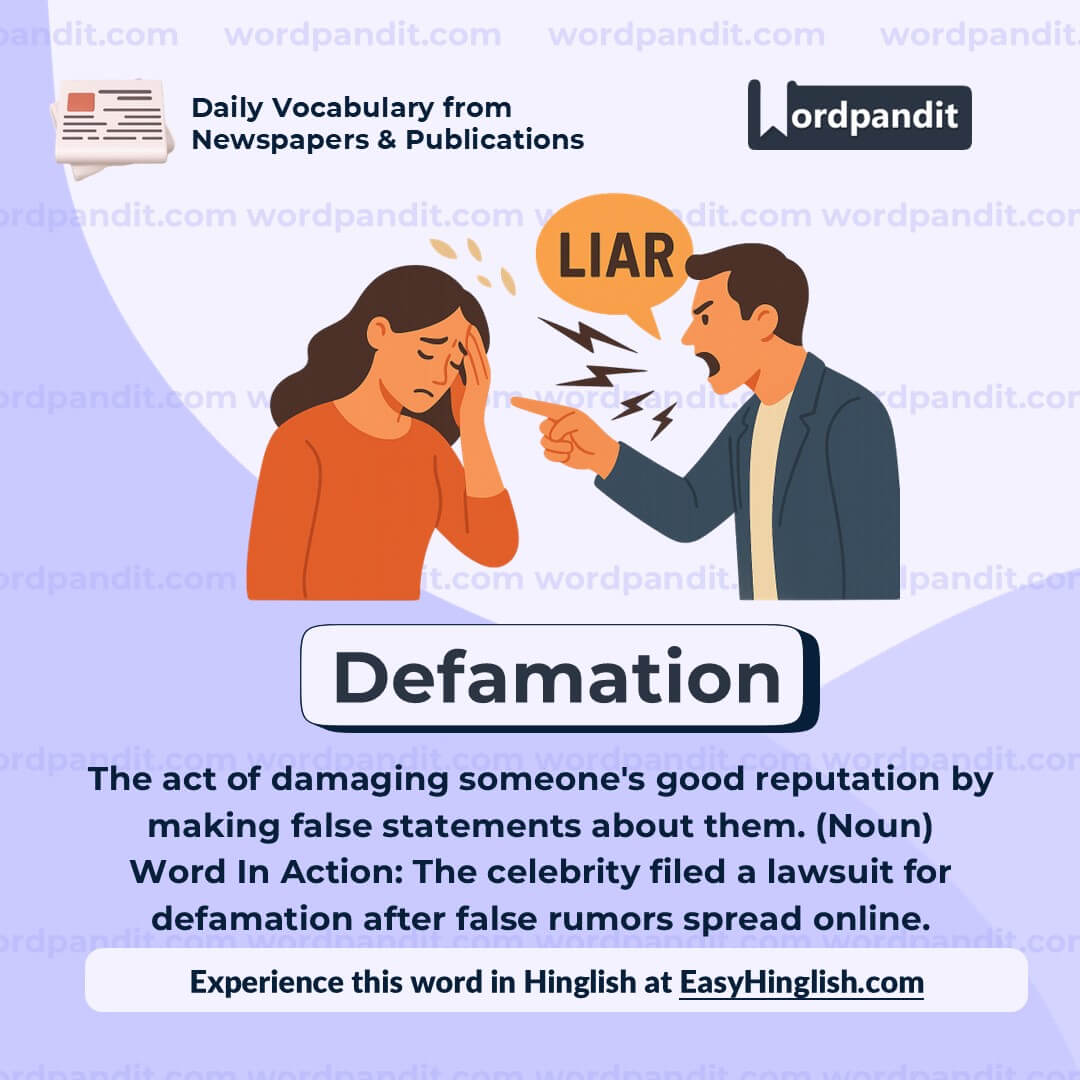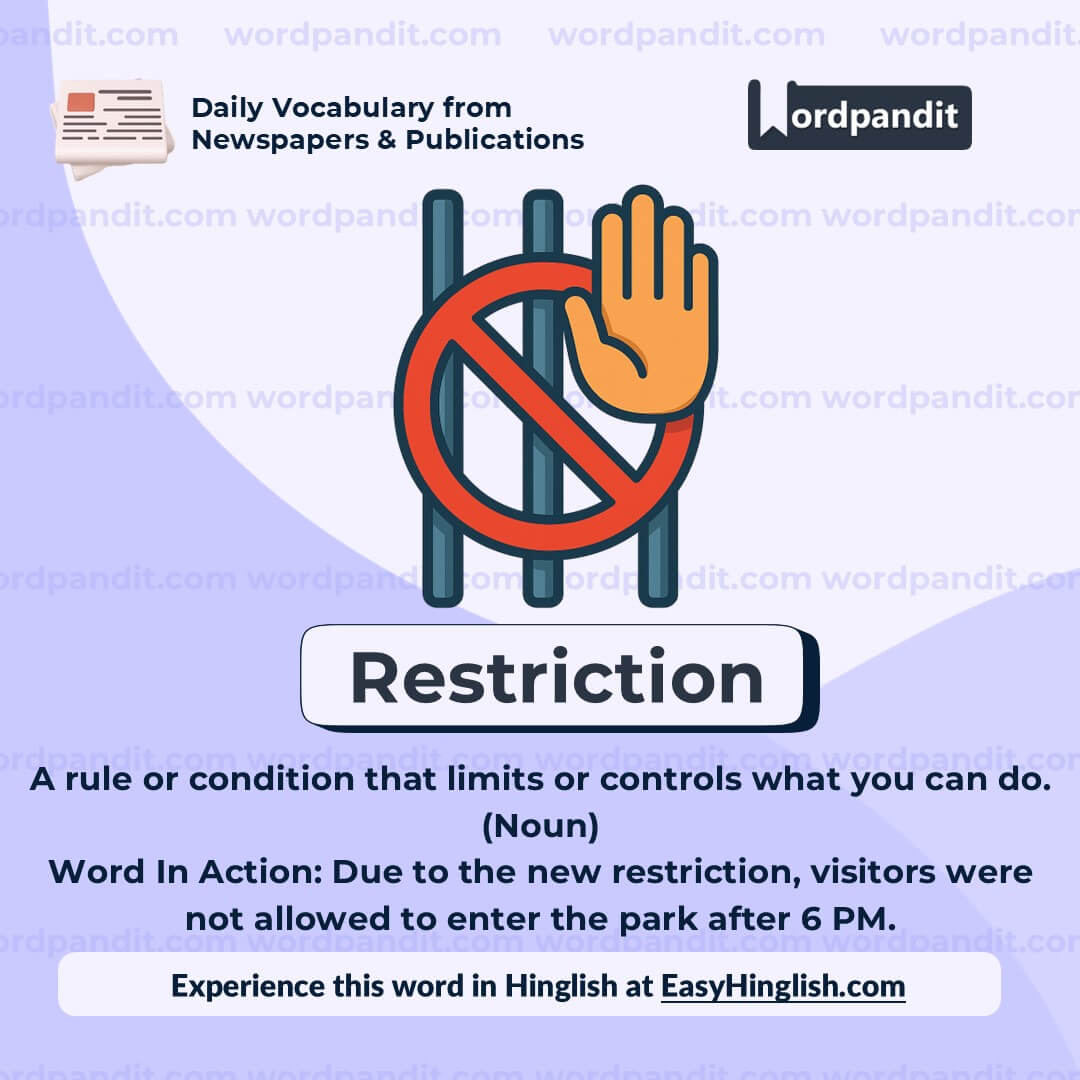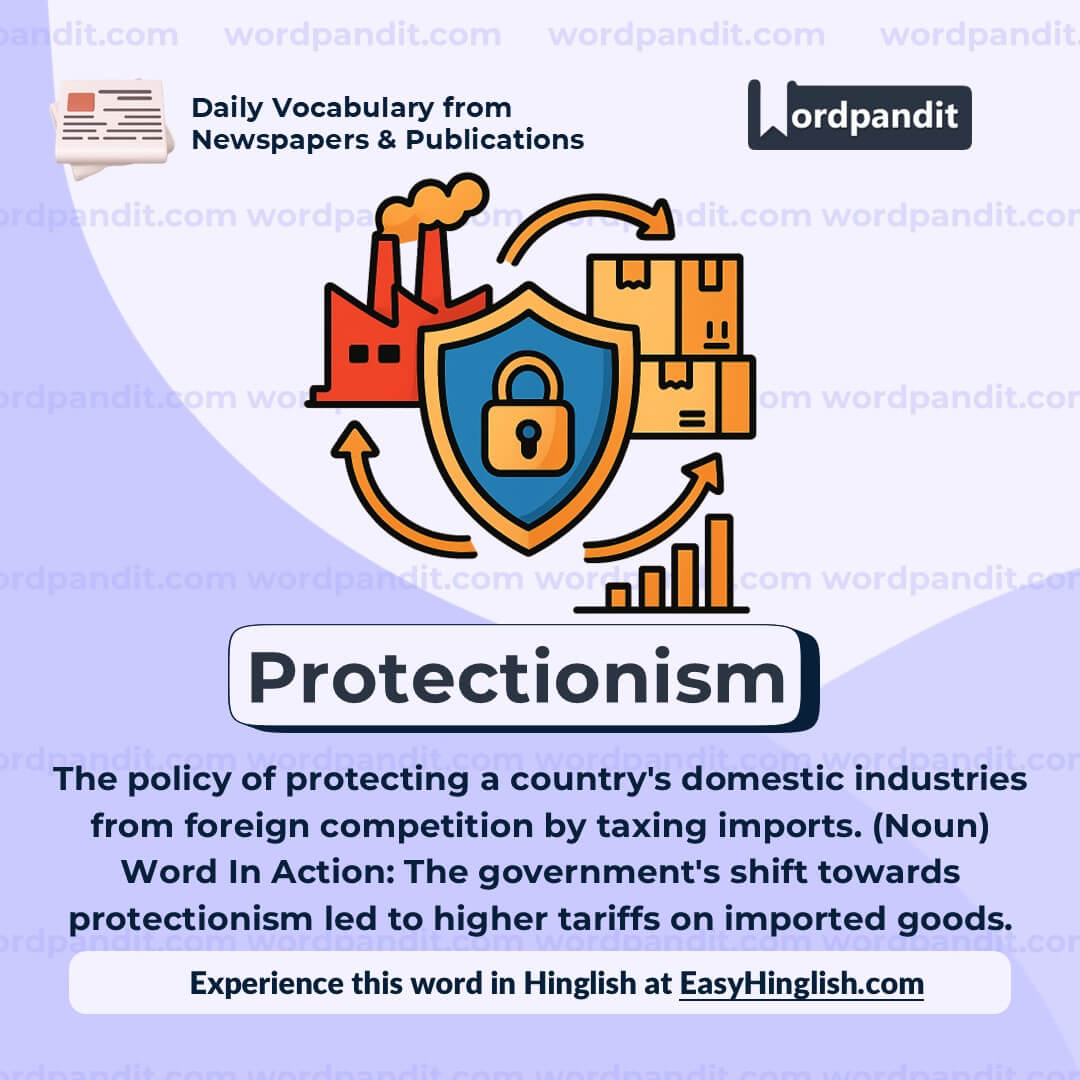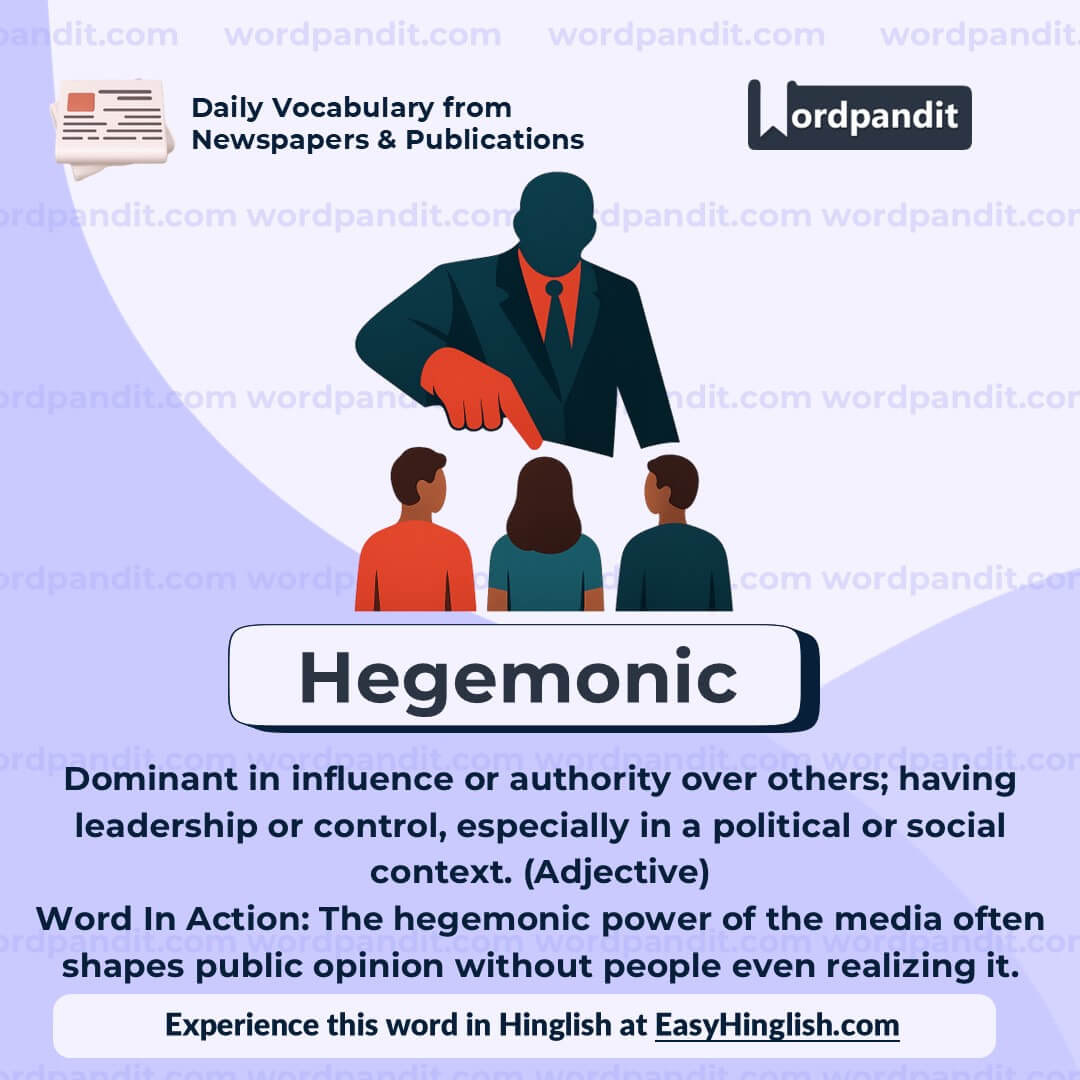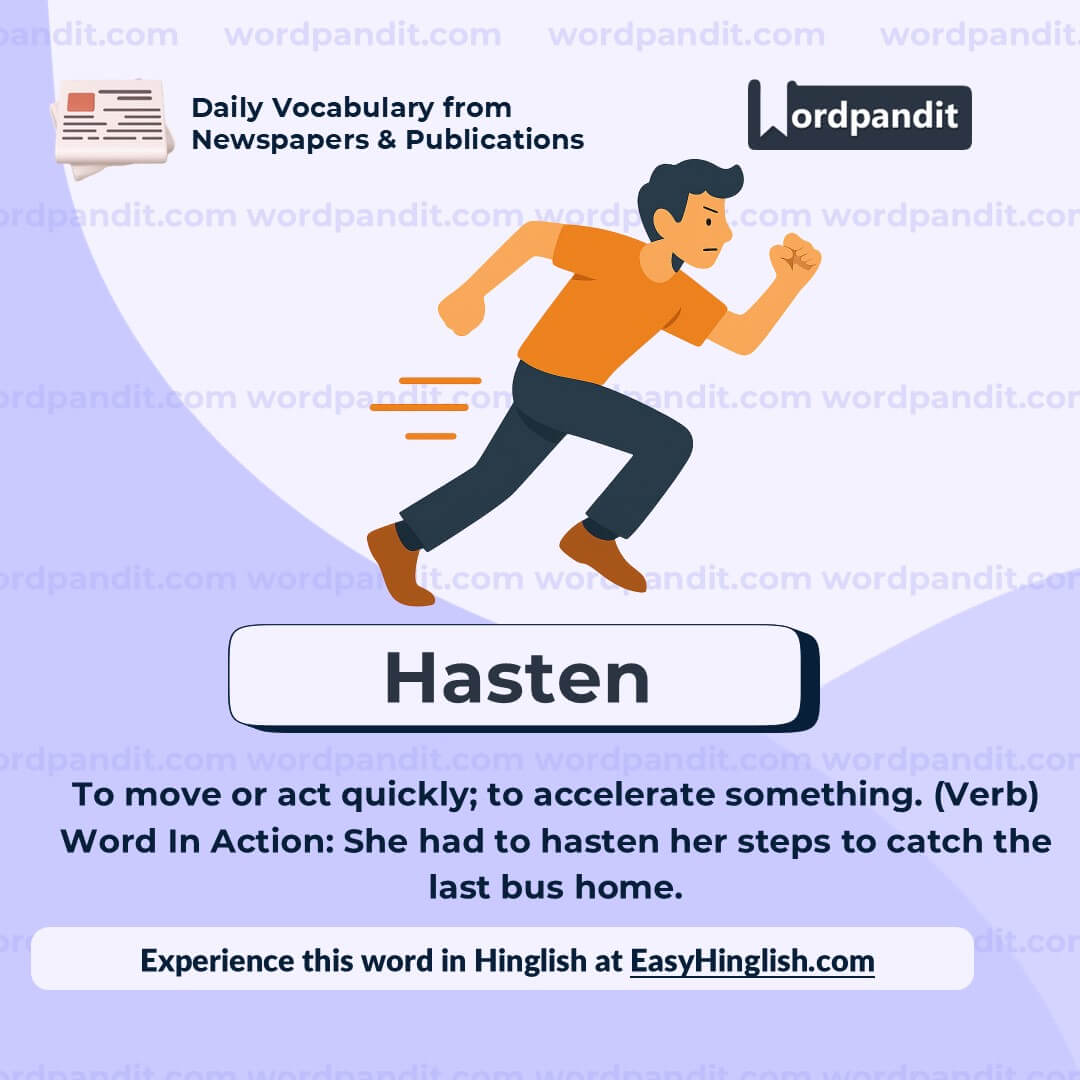Daily Vocabulary from Indian Newspapers and Publications
Welcome to Wordpandit’s Indian Vocabulary Hub
At Wordpandit, we understand the importance of staying rooted in the local context while expanding your language skills. This section focuses on enriching your vocabulary with words and phrases drawn from India’s leading newspapers and publications, ensuring you're learning vocabulary that is practical, relevant, and uniquely Indian.
Why Indian Sources Matter
We believe that the best way to master any language is by immersing yourself in local content. That’s why we carefully curate vocabulary from top Indian publications, including:
- The Hindu
- The Times of India
- The Economic Times
- Hindustan Times
- Live Mint
- The Indian Express
- And many others...
Stay Updated, Stay Relevant
With daily updates from Indian news sources, you’ll be consistently learning words that reflect the trends and shifts in Indian society and culture. Our focus is to provide vocabulary that enhances your understanding of the language in an Indian context.
How Wordpandit Supports Your Goals
Whether you’re preparing for exams, aiming to improve your professional communication, or simply want to stay connected with the latest Indian vocabulary, Wordpandit is here to guide you every step of the way.
Learn with a Practical Approach
Our interactive learning methodology includes real-world examples, engaging activities, and context-specific usage to ensure that every word becomes part of your active vocabulary.
Dive into Indian Vocabulary Today!
Why Choose Wordpandit?
Practical Learning: Focus on words you'll actually encounter in real-world reading, enhancing your comprehension and communication skills.
Diverse Content: From current affairs to scientific breakthroughs, our varied sources expose you to vocabulary across multiple domains.
Effortless Integration: Make Wordpandit a part of your daily routine. Just a few minutes each day can significantly boost your lexicon over time.
Your Path to Vocabulary Mastery
- Visit our Daily Vocabulary section regularly
- Explore new words and their usage in context
- Practice incorporating these words into your own writing and speech
- Track your progress as your vocabulary expands
Start Your Journey Today
Embark on your vocabulary enhancement journey with Wordpandit. By consistently engaging with our daily posts, you'll build a robust vocabulary that serves you well in academic, professional, and personal contexts.
Remember, a word a day keeps linguistic limitations at bay. Make Wordpandit your daily companion in the quest for vocabulary excellence!
WORD-1: Defamation
Context:
"Two defamation cases decided within a week again highlight why criminal defamation is an unreasonable restriction on free speech." - The Times of India
Explanatory Paragraph:
Defamation is the act of damaging someone's reputation through false statements. It can be written (libel) or spoken (slander). In many legal systems, defamation is considered both a civil wrong and, controversially, a criminal offense. The debate often centers around balancing free speech and the protection of individual dignity. Essentially, if someone lies publicly about another person and it causes harm to their reputation, that's defamation.
Meaning: The act of making false statements about someone to harm their reputation (Noun)
Pronunciation: def-uh-MAY-shun
Difficulty Level: ⭐⭐⭐ Intermediate
Etymology: From Latin 'diffamatio' meaning ‘spreading a report or rumor,’ from ‘diffamare’ (to spread abroad).
Prashant Sir's Notes:
Defamation is a crucial legal term that intersects with media, politics, and personal rights. Understanding the nuances between civil and criminal defamation is key for law and current affairs prep.
Synonyms & Antonyms:
Synonyms: slander, libel, vilification, calumny, character assassination
Antonyms: praise, compliment, commendation, honor
Usage Examples:
- The celebrity filed a lawsuit for defamation after false stories were published about her in the tabloids.
- Social media has made it easier than ever for defamation to spread quickly.
- He was found guilty of defamation for falsely accusing his colleague of fraud.
- Freedom of speech does not give one the right to engage in defamation.
Cultural Reference:
"Defamation is becoming a tool to silence criticism and dissent rather than protect reputation." – A commonly discussed view in free speech debates, especially in democratic societies.
Think About It:
Should defamation ever be treated as a criminal offense, or should it remain strictly a civil matter? What are the implications for freedom of speech?
Quick Activity:
Write two short sentences — one that could be considered defamatory and one that is a fair opinion. Discuss why one crosses the line and the other doesn’t.
Memory Tip:
Think of “defamation” as “deforming someone's reputation.” Both start with “defa-” and involve harm or damage.
Real-World Application:
Understanding defamation is essential in professions like journalism, law, and public relations, where statements made can have serious legal consequences.
WORD-2: Restriction
Context:
"Two defamation cases decided within a week again highlight why criminal defamation is an unreasonable restriction on free speech." - The Times of India
Explanatory Paragraph:
Restriction refers to a rule or condition that limits or controls what people can do. It can apply to laws, behavior, movement, access, or speech. In this context, the word “restriction” is used to discuss how criminal defamation laws limit the right to freely express one’s opinion. Restrictions are often debated in democratic societies, where freedom and control must be balanced carefully.
Meaning: A limiting condition or regulation that controls or reduces freedom (Noun)
Pronunciation: ri-STRIK-shun
Difficulty Level: ⭐⭐ Basic
Etymology: From Latin 'restrictio', from 'restringere' meaning ‘to bind fast or confine.’
Prashant Sir's Notes:
Words like “restriction” frequently appear in legal and political discussions, especially around fundamental rights. Always understand what is being restricted and why.
Synonyms & Antonyms:
Synonyms: limitation, constraint, control, regulation, curb
Antonyms: freedom, allowance, liberty, permission
Usage Examples:
- The government imposed travel restrictions to prevent the spread of the virus.
- There are restrictions on what employees can post on social media.
- Free speech should not come with unreasonable restrictions.
- She resented the restrictions placed on her by her conservative family.
Cultural Reference:
"The price of freedom is eternal vigilance" – a phrase often quoted when discussing the balance between freedom and restriction in civil liberties.
Think About It:
When does a necessary rule become an unnecessary restriction? How do we draw the line in public policy and law?
Quick Activity:
List three areas in life (e.g., school, internet, workplace) where you experience restrictions. Write one sentence each about how they help or hinder you.
Memory Tip:
Think of “restriction” as something that *restricts*—just like a seatbelt limits your movement but keeps you safe. Same logic applies to rules.
Real-World Application:
Understanding the idea of “restrictions” helps in fields like law, public administration, and ethics, where decision-making often involves balancing freedom and control.
WORD-3: Protectionism
Context:
"The world’s leading exporters of advanced technologies are now China and other Asian powers, including South Korea, Japan, and Taiwan. Thus, Mr. Trump’s turn to protectionism — an attempt to regain American economic dominance — may well hasten the country’s retreat from its hegemonic position." - The Hindu
Explanatory Paragraph:
Protectionism is an economic policy that aims to shield a country's industries from foreign competition by using tariffs, quotas, or other trade barriers. Governments adopt protectionism to support domestic producers, save jobs, and reduce reliance on imports. However, it can also lead to trade wars, reduced innovation, and higher prices for consumers. In the context above, the term refers to former U.S. President Donald Trump's policies that focused on limiting imports to strengthen American industries.
Meaning: The economic policy of restricting imports to protect domestic industries (Noun)
Pronunciation: pruh-TEK-shuh-niz-um
Difficulty Level: ⭐⭐⭐⭐ Advanced
Etymology: From “protection” + “-ism,” indicating a system or belief; rooted in 18th-19th century economic practices favoring national interests.
Prashant Sir's Notes:
Protectionism is a must-know concept in economics and international relations. Link it to current trade policies, global supply chains, and geopolitical strategies. Be ready to compare it with free trade.
Synonyms & Antonyms:
Synonyms: trade barrier policy, economic nationalism, import restriction, tariff-based policy
Antonyms: free trade, globalization, open markets, economic liberalism
Usage Examples:
- The country adopted protectionism to save its steel industry from collapse.
- Critics argue that protectionism harms consumers by driving up prices.
- Trump's trade war with China was a classic case of 21st-century protectionism.
- While protectionism may offer short-term benefits, it often weakens long-term competitiveness.
Cultural Reference:
"America First" — the slogan under which Trump’s protectionist trade policies were promoted, representing a shift from globalism to economic nationalism.
Think About It:
Can protectionism truly make a country economically stronger, or does it isolate it from global innovation and progress?
Quick Activity:
Research two countries that follow protectionist policies. Make a table comparing the pros and cons each country has experienced because of it.
Memory Tip:
Protectionism = "Protect + -ism" → A belief system or policy focused on protecting local industries from outsiders.
Real-World Application:
Protectionism plays a major role in shaping global trade agreements, tariffs, and even political alliances. Economists, diplomats, and business strategists all analyze its effects regularly.
WORD-4: Hegemonic
Context:
"The world’s leading exporters of advanced technologies are now China and other Asian powers, including South Korea, Japan, and Taiwan. Thus, Mr. Trump’s turn to protectionism — an attempt to regain American economic dominance — may well hasten the country’s retreat from its hegemonic position." - The Hindu
Explanatory Paragraph:
Hegemonic refers to having dominance, leadership, or control—especially by one country or group over others. In global politics, a hegemonic power sets the rules and standards for others to follow, often influencing not just economics but also culture and international policy. In the given context, the word suggests the U.S. may be losing its global leadership or dominant role in the economic sphere as other nations rise in influence.
Meaning: Dominant in influence or authority, especially politically or culturally (Adjective)
Pronunciation: heh-juh-MON-ik
Difficulty Level: ⭐⭐⭐⭐ Advanced
Etymology: From Greek ‘hēgemonia’ meaning ‘leadership, supremacy,’ from ‘hēgemōn’ (leader, ruler).
Prashant Sir's Notes:
This word is common in political science and IR (International Relations). Understand the difference between hegemony (noun) and hegemonic (adjective), and relate it to real-world powers like the U.S., China, etc.
Synonyms & Antonyms:
Synonyms: dominant, controlling, ruling, leading, prevailing
Antonyms: submissive, subordinate, marginal, minor
Usage Examples:
- The United States has long held a hegemonic role in global affairs.
- China’s rise is challenging the hegemonic power of the West.
- Hegemonic control often shapes not just policy but public opinion and cultural norms.
- The media industry is heavily influenced by a few hegemonic corporations.
Cultural Reference:
Antonio Gramsci, an Italian Marxist philosopher, introduced the concept of “cultural hegemony,” where the ruling class manipulates culture to maintain dominance—an idea widely used in sociology and media studies.
Think About It:
Is it possible for a world without a hegemonic power to be more peaceful, or would the lack of a leader lead to greater instability?
Quick Activity:
Identify one current hegemonic power and one emerging power. Write one sentence each explaining their global influence.
Memory Tip:
Hegemonic sounds like “he-gem-onic” → think of a *gem* that dominates or outshines others, symbolizing supreme control or leadership.
Real-World Application:
The term "hegemonic" is crucial in understanding geopolitics, global trade, media influence, and even corporate dominance. Analysts use it to describe how power is distributed and maintained.
WORD-5: Hasten
Context:
"The world’s leading exporters of advanced technologies are now China and other Asian powers, including South Korea, Japan, and Taiwan. Thus, Mr. Trump’s turn to protectionism — an attempt to regain American economic dominance — may well hasten the country’s retreat from its hegemonic position." - The Hindu
Explanatory Paragraph:
Hasten means to cause something to happen sooner than expected or to move or act quickly. It can refer to both physical speed and metaphorical acceleration, such as bringing about consequences or developments more rapidly. In the provided context, the word implies that the turn to protectionism might actually accelerate or speed up America’s decline from its dominant global position.
Meaning: To speed up the occurrence of something; to cause something to happen sooner (Verb)
Pronunciation: HAY-sen
Difficulty Level: ⭐⭐ Basic
Etymology: From Middle English ‘hasten,’ derived from Old French ‘haster,’ meaning ‘to hurry.’
Prashant Sir's Notes:
A common word in editorial writing, especially when discussing cause and effect. Always pay attention to what is being hastened and whether the tone is negative or positive.
Synonyms & Antonyms:
Synonyms: accelerate, quicken, speed up, expedite, advance
Antonyms: delay, slow down, postpone, hinder
Usage Examples:
- The new policy may hasten the arrival of a financial crisis.
- She hastened to catch the train before it departed.
- The company's poor decisions only hastened its downfall.
- Modern medicine can hasten recovery from many illnesses.
Cultural Reference:
The phrase “more haste, less speed” is a common proverb suggesting that rushing something often leads to mistakes, ironically slowing down the process.
Think About It:
Can trying to hasten progress in one area sometimes lead to setbacks in another? Where have you seen this in real life or history?
Quick Activity:
Write two short sentences: one showing someone hastening physically (e.g., running), and one showing something hastening metaphorically (e.g., a policy change).
Memory Tip:
Think of “hasten” like hitting the “fast-forward” button on a remote — it speeds things up!
Real-World Application:
Hasten is commonly used in news articles, policy analysis, and storytelling to describe the speeding up of events, actions, or outcomes — making it useful for essays, speeches, and competitive exams.



